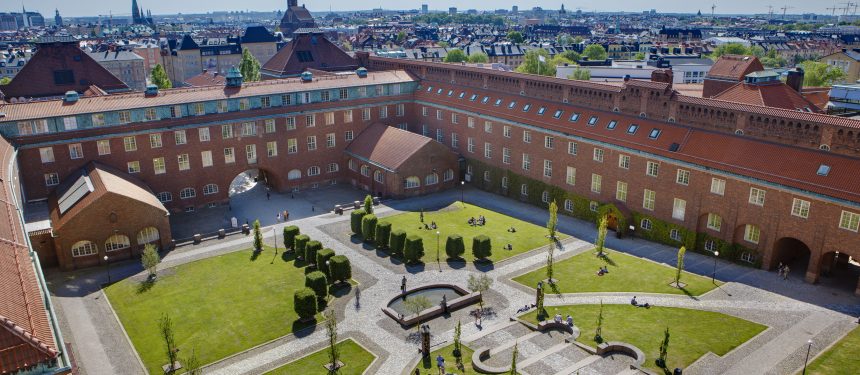The number of fee-paying students attending Higher Education Institutes across Sweden increased by 24% on the previous year in 2017/18, according to Swedish Higher Education Authority (UKÄ) statistics.
News and business analysis for Professionals in International Education
Have some pie!
Sweden: non-EU fee-paying students rose by 24% in 2017/18
 Of its 2,458 freemover students in 2017/18, Royal Institute of Technology (KTH) was the school that enrolled the most tuition paying students – at 1,029 – in 2017/18. Photo: Jann Lipka
Of its 2,458 freemover students in 2017/18, Royal Institute of Technology (KTH) was the school that enrolled the most tuition paying students – at 1,029 – in 2017/18. Photo: Jann Lipka Of Sweden’s 37,837 international students in the 2017/18 academic year, 7,030 students were paying tuition fees, a UKÄ report showed.
This is up from 5,660 paying students in 2016/17.
Tuition fees are a “relatively new phenomenon”, according to UKÄ – fees for non-EU students were introduced in Sweden in 2011, and the country is yet to hit its pre-fee international student numbers of 46,691 in 2010/2011.
“The applicant pool has changed since the tuition fees were introduced”
In the first year of tuition fees in 2011/12, the country’s institutions enrolled 1,469 paying students from non-EU students.
Over half (3,840) of the paying students in 2017/18 were at five institutions in the country – Royal Institute of Technology (KTH), Lund University, Linnaeus University, Chalmers University of Technology and Uppsala University – the report noted.
However, universities have emphasised that motivation for enrolling these students is not to gain from the income that these students add.
“As the university is not a for-profit organisation, it is not relevant to us if the students pay or not as such,” said Maria Lindblad, international marketing manager in the international office at Lund University.
“We don’t have a strategy for students to pay tuition fees, but we do have a strategy to get more non-EU students and in general, they are required to pay tuition fees,” she added.
Lund is proud of its diverse student body, enrolling students from more than 130 countries, Lindblad highlighted, and the university’s marketing and recruitment efforts are focused on non-EU countries.
“It is natural that the number of fee-paying students would grow as the applicant pool has changed since the tuition fees were introduced. The markets from which we receive many students have changed a lot over the years too,” she explained.
With 617 of its international students paying this academic year, Uppsala University has seen a 26% increase in numbers of tuition-paying students on last year.
Its head of unit for student recruitment Joachim Ekström noted that it, too, is actively recruiting non-EU students.
“The reason for that is that education here is very much based on interaction, debate, discussion, etc. and this gets very one dimensional when only EU/EEA-nationals are represented in the classroom,” Ekström told The PIE News.
“With the introduction of fees, we need to work much harder to convince someone from outside the EU/EEA to study in Sweden.”
The foundational idea that student recruitment is about helping prospective students become successful alumni has been a success factor in Uppsala’s recruitment efforts, he added.
“This means we put the students best interest first and look at the whole process until after graduation. We want to get students that we can help reach their career goals, but we’re not perfect for everyone.
“So, for us it is equally important to make the “wrong” prospective students realise as soon as possible that we might not be the right choice for them. We do our best to assist prospective students to reach an informed decision and much of our work is about digital content marketing.”
Of the total 37,837 students in 2017/18, 13,506 were classified as exchange students and the remaining 24,331 categorised as ‘freemovers’. These students arrange their studies in Sweden themselves.
“Our strategy is to attract and recruit qualified students”
Niklas Tranaeus at Stockholm University, which hosted 261 paying students of its 2,516 freemovers in 2017/18, noted that the university seeks to attract more international students from all over the world.
“The objective is not to increase revenue in the short term but to enhance quality in the long term,” he stated.
Striving to have a student body with as international a mix as possible, Chalmer’s strategy is to attract qualified students with “good academic backgrounds from well-ranked universities from around the world, regardless of whether they will pay fees or not,” said Cecilia Hillman, project manager – international student recruitment, at Chalmers.
Along with its marketing team, which has a “broad focus” geographically and works primarily digitally, the university also conducts market-specific campaigns in a number of target-countries – such as China, India, Indonesia, Turkey, Iran, Mexico, Colombia, Brazil, USA, Canada, Hillman said.
When fees were introduced, Sweden established two scholarship programs, the report indicated.
One, covering tuition only, is to promote internationalisation at HEIs by “helping with recruitment of particularly qualified students from countries outside the EU/EEA”.
The other, covering all tuition fees and cost of living, focuses on scholarships for students from countries that Sweden has a long-term development collaboration with or from countries classified by the OECD as low- or medium- income.
Institutions have also established their own scholarships for fee-paying students.
Select examples include Chalmer’s Volvo scholarships for Chinese and Indian students, Uppsala’s King Carl Gustav Scholarships for students who live in unsafe and dangerous conditions conflict areas outside Europe, or Lund’s Ingvar Kamprad Scholarship for design masters students – named after the founder of IKEA.
In autumn semester 2018, 14% of paying students had a Swedish scholarship that covered their entire tuition fees and 9% had scholarships that covered parts of their tuition fees, UKÄ’s report highlighted.
Still looking? Find by category:


